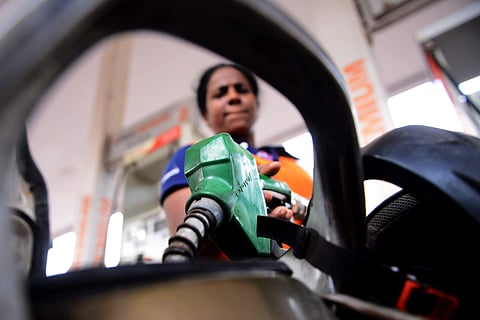

US crude oil futures crashed to a historic minus $37.63, but consumers filling fuel at the pump won't be sent home with $37.63 gift bags in return.
Far from it, fuel prices in India are unlikely to correct significantly either from about Rs 76 for petrol and Rs 66 for diesel. Here's why.
India imports Brent Crude from the Organisation of Petroleum Exporting Countries (OPEC) block and not the US West Texas Intermediate (WTI), the future contracts of which fell into the negative zone on Monday.
The India basket comprising a weighted average of Oman, Dubai, Brent Crude is currently priced about $20 per barrel, which we pay in dollars, not rupees. The Indian currency, in line with its Asian peers is weakening, offsetting any potential gains from lower prices.
"India is not impacted by the fall in WTI crude because we import Brent Crude, which is around $22 per barrel, but relatively stable. Moreover, there are no storage issues yet in it. The future contract of Brent is not physically delivered unlike WTI, which is delivered at Cushing (Oklahoma)," Amit Kumar Gupta of Adroit Financials told The New Indian Express.
But shouldn't a steady decline reduce prices in the next few months if not now?
Technically yes, but pump prices have an added component of central and state levies to make up for the subsidies given to state-run oil refiners. Like in the past, the government may as well raise excise duty on fuel and use the windfall to balance its books.
"The government may increase excise duty to make up for shortfall in revenue due to the Covid-19 lockdown. Lower fuel prices are unlikely in a substantial manner," Gupta reasoned.
Global oil consumption too is on the decline leading to a supply glut of 1.8 billion barrels. Prices will likely stay low in the near term at least until oil producers lower production. While production cuts appear unavoidable, the question is to what extent. Analysts believe shutting down production lines may prove costlier than continuing with lower crude prices due to its oversupply.
The country may consider buying it cheap and storing for a later day, but that's unlikely to happen either as much of India's oil storage units are up to the brim already as the country is under lockdown with hardly any demand for oil.
India's storage capacity at Vizag, Mangaluru and Padur can barely store 10 days’ worth oil, while additional capacities being built will take time to be commissioned. For context, China's storage reserves are believed to be worth 90 days and analysts expect the Indian government to strengthen reserves as part of its energy security initiative.
Gupta, however, said low prices still will be beneficial for India's current account deficit as every $1 fall in crude price translates to Rs 2,900 crore gains.